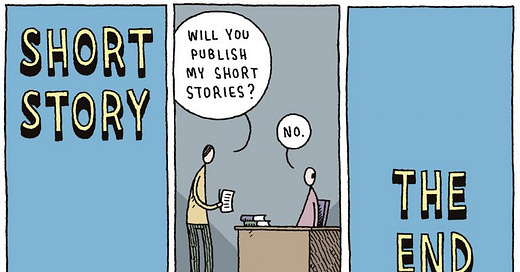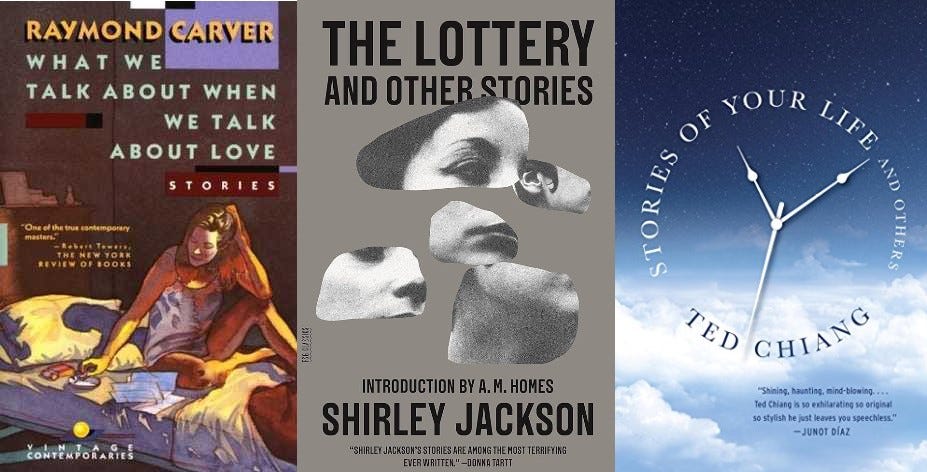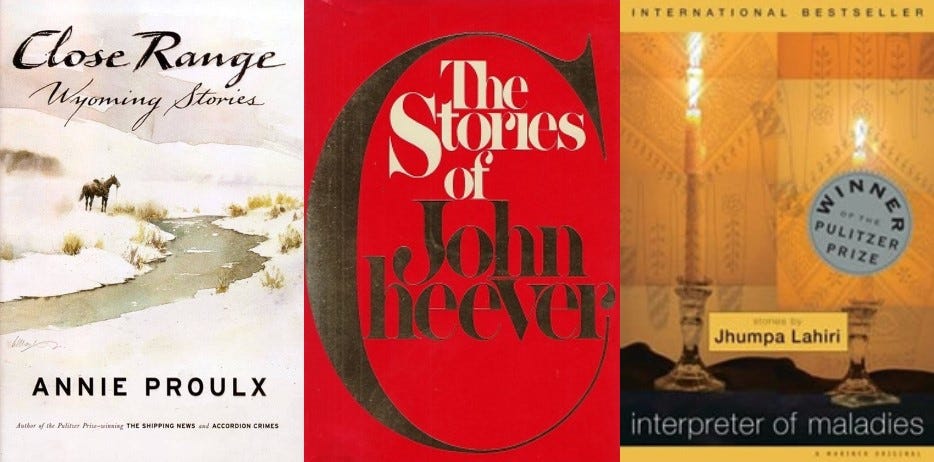What's American Fiction Without the Short Story?
A short paean for the Great American Literary Form

This week, The Atlantic published a new list of “The Great American Novels.” It’s full of both expected classics as well as both good and/or weird surprises. There is no way to do these lists without the former and no point in doing them without the latter. Overall, I think The Atlantic did a fine job. I appreciated the inclusion of graphic novels (Sabrina and Watchmen) and especially the genre books. Certainly novels like Chandler’s The Big Sleep, Le Guin’s The Dispossessed, Butler’s Kindred, and Jackson’s The Haunting of Hill House deserve spots. What’s American literature without science fiction, horror, and hardboiled detective fiction? Excluding them would be like excluding Westerns and rom coms from a list of Great American Movies.
Still, the main thought I had while reading the list was… where are the short stories?
Yes, I get that the list was restricted to novels. That’s fine and good. But reading the article made me think about how central the short story is to American literature. Indeed, it might be the quintessential American literary form. (I was hardly the only person to think along these lines: Amber Sparks, Sterling HolyWhiteMountain, Aaron Burch, and others had similar thoughts.)
Can you tell the story of American literature without Raymond Carver, Flannery O’Connor, Donald Barthelme, Ted Chiang, John Cheever, Edgar Allan Poe, Lorrie Moore, or Denis Johnson?
Without “Sonny’s Blues,” “The Lottery,” “The Swimmer,” “Hills Like White Elephants,” “Girl,” “Bartleby, the Scrivener,” “Where Are You Going, Where Have You been,” “The Tell-Tale Heart,” “Brokeback Mountain,” or countless other titles we could insert here?
Hell, does it make sense to put writers like George Saunders, Joy Williams, Annie Proulx, and Jhumpa Lahiri on here for novels that—great as they might be—are not as good or influential as their story collections? A Great American Fiction list would, I think, instead list Pastoralia (or perhaps Tenth of December), Taking Care, Close Range, and Interpreter of Maladies, respectively.
There are some other authors on the list, like King and Bradbury, whose novels’ importance is hard to argue against. Still, I prefer their stories. (Try Night Shift and The Illustrated Man.)
This is really less a critique of The Atlantic’s list than a thought about American literature in general and perhaps a lament for the declining role of the short story. Because it is hard not to notice the shrinking prestige of short stories, even as the form is as vibrant and alive as ever in American letters.
Part of this has nothing to do with literature, per se. The past few decades have seen the much-discussed destruction of American magazines and newspapers. Many have disappeared and those that survive depend on online clicks. There’s not much space for short stories, and even less money for short story authors.
But there are other factors. I often wonder what things would look like if the big literary awards followed the lead of the genre awards—such as the Hugo and Nebula—and included short story categories. The National Book Awards and Pulitzers command attention, readership, and press coverage. Short story collections theoretically compete for the Fiction category, but in practice almost never win. In my lifetime, only two straight story collections (A Good Scent from a Strange Mountain and Interpreter of Maladies) have won the Pulitzer for example.
I do have to shout out The Story Prize here, but I believe the short story is a unique enough form to merit it's own award categories in the biggest awards. It’s as distinct a category as Young People’s Literature and Poetry (to pick NBA categories) and certainly as distinct as the multiple Pulitzer non-fiction book categories (to say nothing of the many journalism awards).
Not that it’s up to me, but, you know, just saying.
Another problem for the short story is that big publishers have increasingly decided not to publish them. It used to be quite common to start your career with a two-book deal, one story collection and one novel. Back then, there was an idea an author would stay with a publisher and that publisher would build their whole career. Today, it’s more common for the big publishers to allow authors—who still write and love short stories—to have a collection on a small press and then snatch them up for a novel. (This is part of why some call small and indie presses the “minor leagues” that the big publishers poach for talent.)
There is doom loop aspect here. Because big publishers don’t publish stories as often, they don’t have big publicity behind. Because short stories are not awarded as often, they do not get the coverage that awards bring. Because they don’t have the publicity dollars or awards coverage—and tend to get left off listicles—they don’t sell as many copies. Thus justifying not publishing, awarding, or listing them.
I honestly believe there is more appetite for short stories than publishers might realize. In recent years, books like Carmen Maria Machado’s Her Body and Other Parties and Nana Kwame Adjei-Brenyah’s Friday Black have been break-out hits and sold plenty of copies. And, while I don’t want to call any authors out, increasingly many “novels” are simply lightly fixed-up short story collections. Publishers and readers seem to simply want to see the word “novel” on the manuscript even if it is a bunch of stories. (Ditto novellas, a category that has functionally disappeared as publishers simply put them out as “novels.”) Hell, one might even argue a few of The Atlantic’s picks like A Visit from the Goon Squad are, in truth, a bunch of short stories in a novel trench coat.
Anyway, I don’t know how to solve these issues. But next time you’re in a bookstore, give a short story collection a try. (Here’s mine: Upright Beasts.) And the next time you’re writing a listicle, remember novels aren’t all there is.
Speaking of story collections, I wrote the titular story in The Werewolf at Dusk, a collection of illustrated stories by David Small that came out this week (!). If you like graphic novels and weird short stories, check it out.







One would think short stories would be tailor made for the attention span we have today: a story you can actually finish and that too in one sitting.
I think the SS is a complete art form in itself, not mere training ground for writing a novel. It is not playing on the JV team until you’re good enough to “graduate” to the novel form. Similarly, writing flash fiction is completely different from writing a SS, not just an exercise on your way to writing a SS.
I prefer the SS form for my own writing and have no desire to write a novel. Of course I realized eons ago that I would never become a well-known SS writer. But that isn’t why I write.